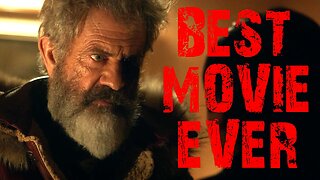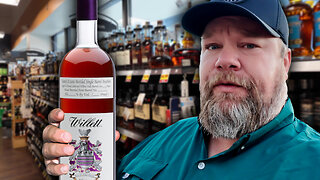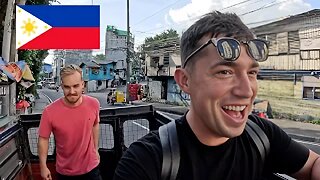Premium Only Content

Official Sir Coxsone Sound System ft Tenna Fly & Daddy Freddy Brixton 1989
Official Sir Coxsone Sound System ft Tenna Fly & Daddy Freddy Brixton 1989
Tenor Fly, born Jonathan Sutter, Brixton, London, England, began his career with Lloyd Coxsone’s Outernational Sound System, working alongside such dignitaries as Jah Screechy and Blacker Dread. In 1989 his debut release, “Roughneck Fashion”, topped the UK reggae chart, and was swiftly followed by the equally successful “Inner Cities”.
His growing reputation led to collaborations with the Ragga Twins (under the guise of Demon Rocker), the highly acclaimed DJ Top Cat, and seasoned vocalist Nerious Joseph. He has also enjoyed crossover success, having three consecutive Top 40 hits with Rebel MC aka Congo Natty, “Tribal Bass”, “Wickedest Sound” and ‘Coming On Strong”. In 1994 his satirical interpretation of the Monty Python Life Of Brian chant, “Bright Side Of Life”, over a sample of Nina Simone’s “My Baby Just Cares For Me”, rewarded him with a UK Top 50 hit. His success was followed by the Big Orange duet, “Let’s Play”, reuniting the deejay with singer Nerious Joseph.
In 1996 Tenor Fly toured Japan, appearing alongside Top Cat and Sweetie Irie at the annual Japan Splash Festival. On his return he was invited to perform on the Louchie Lou And Michie One album, “Danger Us”, for the track “Before The Night Is Over”. In 1997, he embarked on recording sessions for his long-awaited debut, to be released by his advocate Top Cat on the DJ’s own Nine Lives label. Later on the charismatic Tenor Fly became one of the most distinctive voices in breakbeat and drum&bass/jungle and remained a constant vocal & lyrical force in the music scene till the day he died.
Anyone who has heard him through his solo work and collaborations with other artists, his lyrical contributions to reggae influenced music from jungle to dancehall or at one of the many events he has performed at, will know the man’s passion and love for the music. Without any doubt, one of the baddest UK MC’s to ever pick up the mic.
The world's fastest rapper according to the Guinness Book of World Records, Jamaican-born Daddy Freddy was also one of the first artists to fuse ragga and dancehall with hip-hop, helping establish a style that would become highly influential during the '90s. Freddy (born S. Frederick Small, 1965, Kingston) grew up in the Trenchtown area and began performing for his uncle's sound system, eventually moving on to join Lieutenant Stitchie and, most importantly, Sugar Minott. His gig with Minott's sound system helped make his name in Jamaica (and, following an overseas tour, the U.K.); in 1985, he made his first recording for Clement "Coxsone" Dodd's Studio One label, a single titled "Zoo Party," that was built on the rhythm of the early ragga smash "Under Mi Sleng Teng." Aided by his hit debut album Body Lasher, Freddy scored a remarkable six Top Ten hits in Jamaica during 1986, including a collaboration with Pinchers, called "Joker Lover," that topped the charts.
In 1987, Freddy returned to the U.K., where he signed with the Music of Life label and began working with producer Asher D. The resulting album, Raggamuffin Hip-Hop, was one of the first fusions of dancehall toasting with hip-hop rhythms, breaking a great deal of new ground. Freddy continued to record dancehall reggae singles for the Jamaican audience while making guest appearances with pop and dance artists like Go West, Meli'sa Morgan, and Beats International (the pre-Fatboy Slim project of Norman Cook). In 1988, Freddy entered the Guinness Book of World Records with a rap that topped 500 syllables per minute. Despite success in the U.K. and Jamaica, Freddy hadn't made as much of an impression in the States, and he aimed to change that by signing with Chrysalis for the 1991 album Stress and the accompanying single "Daddy Freddy's in Town." Both enjoyed modest success, and the Capitol-issued follow-up album, Raggamuffin Soldier, scored positive reviews, but Freddy never quite became a breakout star in America even with his tremendous technical skill. Freddy soon elected to take a break from his frenetic late-'80s recording schedule, releasing his last Music of Life album, The Big One. However, he staged a comeback in 2000 with the acclaimed Old School, New School, a collaboration with new U.K. dub wizard the Rootsman. Freddy subsequently returned to Jamaica to begin recording some new dancehall material.
❤️💛💚
Follow us on the new platform at rumble.com for all our latest videos
WATCH THE FULL VIDEO @ https://youtu.be/Y6AoyAR36wQ
-
 5:32
5:32
Official Don Sinclair Reggae Vibes
1 year agoOfficial UK Sound System Heritage Rough But Sweet Sound System
103 -
 29:54
29:54
Michael Franzese
12 hours agoCan Trump accomplish everything he promised? Piers Morgan Article Breakdown
111K49 -
 2:08:19
2:08:19
Tactical Advisor
16 hours agoThe Vault Room Podcast 006 | Farwell 2024 New Plans for 2025
183K11 -
 34:12
34:12
inspirePlay
1 day ago $5.55 earned🏆 The Grid Championship 2024 – Cass Meyer vs. Kelly Rudney | Epic Battle for Long Drive Glory!
84K8 -
 17:50
17:50
BlackDiamondGunsandGear
14 hours ago $2.84 earnedTeach Me How to Build an AR-15
58.3K6 -
 9:11
9:11
Space Ice
1 day agoFatman - Greatest Santa Claus Fighting Hitmen Movie Of Mel Gibson's Career - Best Movie Ever
116K47 -
 42:38
42:38
Brewzle
1 day agoI Spent Too Much Money Bourbon Hunting In Kentucky
78.7K12 -
 1:15:30
1:15:30
World Nomac
22 hours agoMY FIRST DAY BACK in Manila Philippines 🇵🇭
60.9K9 -
 13:19
13:19
Dr David Jockers
1 day ago $11.59 earned5 Dangerous Food Ingredients That Drive Inflammation
79.9K17 -
 1:05:13
1:05:13
FamilyFriendlyGaming
1 day ago $15.88 earnedCat Quest III Episode 8
130K3